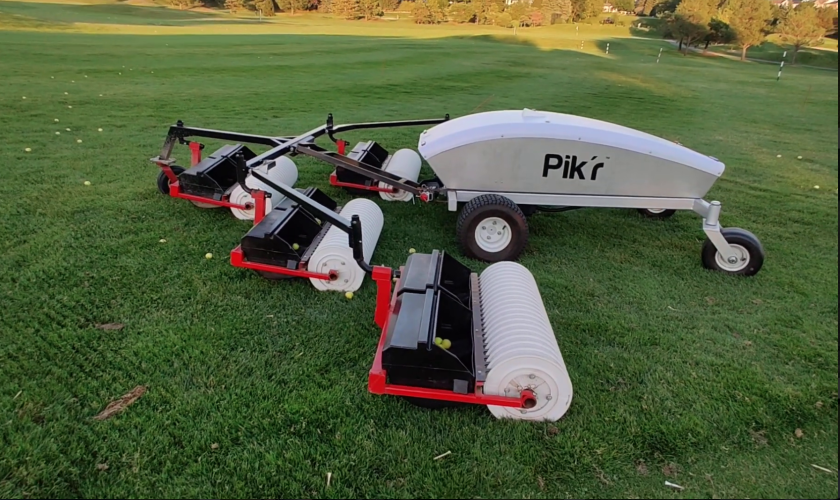Home » Pik’r is its name, range balls is its game – Korechi Innovations makes plans to commercialize its autonomous robot
Pik’r is its name, range balls is its game – Korechi Innovations makes plans to commercialize its autonomous robot

Scientific range picker is designed to alleviate golf’s labor shortage while enhancing operational safety
WINTER GARDEN, Florida — There were thousands upon thousands of balls, clubs and shafts at tue’s 20th PGA Show Demo and Fitting Day to test and touch, and some of golf’s biggest stars such as Lexi Thompson made appearances for their respective brands.
But leave it to a robot to grab some of the day’s spotlight.
Its name is Pik’r, the world’s first heavy-duty, high-capacity robot that automates existing pickers at any driving range or practice facility — even on artificial turf.
And it was busy at work scooping up balls in a showcase grid at the Orange County National Golf Center, where the industry’s top names in golf equipment such as Titleist, Cobra Golf, Ping, Mizuno and Topgolf Callaway returned to show off their latest brand launches after sitting out one of the sport’s biggest events in 2022 because of COVID-19 issues.

Korechi Innovations Inc. is certainly not one of the biggest names in golf, in fact, the Canadian company actually specializes in robotics for the farming industry.
The company was founded by Sougata Pahari in 2016, and he began testing the GPS technology-based range-picking robot in 2019.
“We did extensive testing at various facilities — some flat, some with hills, some with synthetic turf — and now we’ve announcing this to the world,” he says. “We took off the covers so to speak this past fall and we’re getting a tremendous amount of interest from literally all countries other than Antarctica.
“The biggest (design) challenge was we needed to get to the right weight distribution. We didn’t want it to be unnecessarily heavy, and we needed to keep it looking clear. Earlier versions had antennas sticking out on top and they were going to be hit by the golf balls. The sides are now all stainless steel. We encourage people to hit this when it’s on the range.”
The first 10 Pik’r robots will be in operation in March — all in Canada where the company is based.
The robots will lease for $2,000 a month, with a three-gang picker capable of scooping 2,400 balls per trip and a five-gang upwards of 4,000 balls.
Golf courses or practice ranges can schedule picking and monitor the Pik’r remotely via an app. The lithium battery can last up to 13 hours and coverage of the picker is up to 4 acres.
“You don’t need to change your facility to adopt us. Be as you are,” Pahari says. “But somebody is still required to empty the basket.”
The robot can be programmed to text employees or a golf pro when the bucket is full, allowing for up to three phone numbers to be programmed in case the picking starts during one shift and ends when another employee is on site.
The Pik’r can also be programmed to pick different zones on the range, depending on which areas are busy during certain times of the day.

“We initially thought we were helping golf courses save labor, but when we reached out to some test facilities to do interviews in Ontario, New York and Texas — to give different variations of sites and weather — everyone said ‘Yeah, labor cost is a problem but a bigger problem is the workers just don’t show up and nobody is available.’ We found this out after we designed this thing, so that was interesting.”
The Pik’r is also being billed as energy efficient, environmentally friendly and safe. It uses a camera with Artificial Intelligence to detect and avoid obstacles.
“It’s all electric, that’s why it’s so quiet,” says Pahari, noting that courses can save as much as 22 gallons of gas per month. “You are also saving on emissions and believe me all these regulations are going to hit the golfing market sooner or later.”
The Pik’r product will at first be on a lease basis, similar to some of the golf scooter companies that require a monthly service fee that includes on-site maintenance.
“The very first batch we’re keeping in Ontario and with good reason,” Pahari says. “It’s easy to say ‘I’ll sell you one unit’ but we only want to sell them where we can offer service. We don’t want for places to have a bad experience. It’s a mechanical product and still things can break down.”
He is planning for a 2024 launch in the United States.
“We’re exploring partnership opportunities with different suppliers who already have distribution and service capabilities so we don’t have to do everything from scratch,” he said.
Pahari even had a technical side to his location at Demo Day.
“We pointed to this location on Google Maps and asked if it would be available,” he says. “They were able to accommodate us, and we’re thrilled to be here at our first-ever PGA Show.”
Innovation Factory
Innovation Factory is a business accelerator, dedicated to helping Ontario-based businesses launch, scale, and succeed. Supporting the Brant, Halton, Hamilton and Norfolk regions, we provide start-ups, and scaling companies with advisory services, training, mentorship, and strategic connections to help bring disruptive technologies to market, leverage intellectual property, increase revenues, attract investment and create jobs. Innovation can happen anywhere, our goal is to make it work everywhere. We work to elevate key industry sectors including advanced manufacturing, clean tech, information technology, smart transportation, life sciences & health care and social innovations. We are passionate about driving the growth of Ontario businesses like yours. Whether you are an entrepreneur bringing new ideas to market or a scaling business trying to get to the next level, we want to help.

